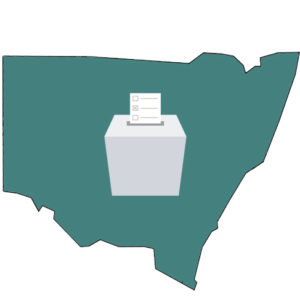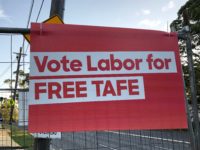Community Colleges Australia CEO, Dr Don Perlgut, writes the following analysis of one aspect of the NSW state election:
Why has universal support for TAFE become a major feature of this week’s New South Wales state election?
Community Colleges Australia (CCA) has reviewed and analysed the vocational education and training policies of all major political parties – and some of the minor parties – participating in the NSW election this Saturday, 23 March. Here is a summary:
MAJOR PARTIES
NSW Labor has promised a 10-year plan to provide 600,000 students with free TAFE courses in a bid to reduce skill shortages, and “guarantee that at least 70 per cent of vocational education and training funding will be allocated to TAFE,” which “will maintain TAFE’s position as the leading provider of vocational education and training in NSW.”
NSW Nationals have promised to build six more TAFE campuses across regional NSW: in Byron Bay, Cobar, Hay, Jindabyne, Nambucca Heads and West Wyalong, in addition to those campuses previously promised at Batemans Bay and Nelsons Bay.
NSW Liberals have made four recent election announcements: a new TAFE campus for Western Sydney near Penrith, 100,000 free TAFE training courses, a commitment to a 250,000 jobs target with vocational high schools and a TAFE-run women entrepreneurs training program.
SMALLER PARTIES
NSW Greens state that “a publicly funded TAFE system should be the dominant provider of vocational and further education and training, with no student fees or charges so that TAFE is affordable to all”; and there needs to be “an end to privatisation and competitive tendering policies for TAFE, and ensure that no public funding is used to subsidise the work of for-profit training providers.”
Shooters Fishers and Farmers Party NSW education policy supports “the development and expansion of the TAFE system and opposes any funding cuts, especially in regional NSW.”
One Nation NSW policy states that “TAFE is in need of urgent repair, both in terms of teaching standards and student outcomes”; that TAFE needs “a role and status in skill development no less prestigious than the university system”; and supports “NSW Labor’s commitment for 70 percent of VET money to go to TAFE.”
WHY UNIVERSAL SUPPORT?
There has probably been no recent Australian election whereby TAFE has received such universal support across the political spectrum. I put forward five reasons why this is happening now:
The bankruptcy of “neoliberalism” and the marketisation of VET
Increasing number of commentators – and not just on the “left” side of the political and ideological spectrum – are criticising the impact of “neoliberalism”, and its resultant impact whereby Australia’s VET system has been “marketised”.
The large number of VET students who studied with private for-profit providers – 2,549,380 (60.2% of the 2017 total) – indicate that VET as an education sector has substantially been taken over by the private sector. By comparison, TAFE’s share of the total VET “market” in 2017 nationally fell to a low of 16.1% in 2017, with some 680,180 students (although NSW has maintained a position above the average). Community providers in 2017 constituted 384,260 students (9.1%), with the others being schools (1.9%), enterprise providers (1.8%), universities (1.3%) and “more than one provider type” (9.6%).
Here’s what some commentators have said about marketisation:
Former Reserve Bank Chair Bernie Fraser: Neoliberalism has caused “misery and division”; our economic record deserves only “qualified applause” because “too many Australians remain unemployed, under-employed, under-skilled, underpaid and lack job security”.
Ai Group NSW Head, Mark Goodsell: a decision “to scrap TAFE fees for new apprentices delivers a strong signal of support for this important source of key skills for the (NSW) State's economy and is welcomed by industry.”
Business Council of Australia CEO, Jennifer Westacott: "We can’t just say let the market work, because it doesn’t always work for everybody…. It doesn’t often work for disadvantaged people, it doesn’t work in certain locations [and] it doesn’t work for emerging skills. Whenever you hear people say, ‘Let the market just run,’ you say: to what end and what purpose? Market reform has to be about outcomes, not fads."
Australian National Audit Office report on the Administration of the VET FEE-HELP Scheme acknowledges that a free-for-all Australian VET market is wrong. Paragraph 27 of the report details how there was an average tuition fee increase of 342% over a six year period due to VET FEE-HELP, and a variation in course fees of up to 1000%.
University of Sydney Fellow Dr Philip Toner: “The creation of a ‘training market’ for public and privately funded vocational education and training (VET) is one of the most transparent failures of neoliberal public policy over the last three decades. There is a direct line connecting the early neoliberal economic arguments and pedagogy formulated by VET mandarins – those who designed and managed the VET system in the early 1990s – to its subsequent implementation. The VET market is an exemplar of the great damage inflicted when a naïve, idealised neoliberal conception of how markets work becomes the basis for public policy.”
The persistence of unemployment and an uneven wage market
Finding work is becoming more difficult for young Australians. With one in three young people unemployed or underemployed, young people are not benefiting from economic or job growth in the state. The youth unemployment rate is more than twice Australia’s overall unemployment rate and in NSW, 84,900 young people are not in paid work. Despite 60% of young Australians achieving post school qualifications, half of Australia’s 25-year-olds are unable to secure full-time employment.
Young people want education to be free or more affordable, to ensure that everyone has access to a well-funded and relevant education system, according to a survey of 3,400 young people done by Youth Action in 2018. Young people, especially those from rural and remote areas, those with a disability, and those from low SES backgrounds continue to face disproportionate challenges in our state education system.
Historically Australians trust government provided services
Australians historically trust government: we may distrust our politicians and abhor their behaviour, historian Judith Brett says, but we value the role of government in our lives, which includes trusting our electoral system. The challenges of living in a harsh land such as Australia has meant that we rely on – the turn to – governments much more than, say, Americans.
The “long tail” of VET FEE HELP
The now-closed but disastrous and much-abused VET FEE-HELP Commonwealth loan scheme – still causing pain years later – has exhausted the population hearing about failed private for profit VET providers and created a longing for a past time when education providers were reliable, ethical and consistent. VET FEE-HELP was “the biggest public policy scandal in Australian history: the systematic rorting of the vocational education and training system.”
The persistence of the TAFE brand
One of CCA’s regional NSW members has reported students standing outside his community college, saying “I’m going to TAFE today”. Except they weren’t; they were attending the local community college.
No other post-secondary provider has the same level of national awareness in Australia as TAFE does: certainly not Community colleges (not even close), which my organisation represents. And probably no individual university, given their local and state locations.
TAFE NSW points to a history extending back almost 185 years to the establishment of Sydney Technical College, although the name Technical and Further Education – TAFE – was not fully established until the 1970s with the 1974 Kangan Report.
Finally, there is a growing (although uneven) realisation that VET and higher education now constitute a continuum and that public institutions serve the population very capably in higher ed, so why should VET be different?
TAFE AND THE NOT-FOR-PROFIT COMMUNITY EDUCATION SECTOR
Community Colleges Australia recognises the shared values and important contributions that TAFE and community education providers undertake to promote access and equity in education and training across all segments of Australian society.
CCA also believes that to meet Australia’s skills needs and to promote sustainable economic development, it is essential that governments directly fund and operate VET providers and systems. CCA recognises that TAFE is both the largest provider and an anchor institution for equitable VET, playing a particularly important role in training apprentices; skilling regional, rural and remote Australian communities; and meeting the needs of special groups such as Indigenous Australians. (Read CCA’s full policy on TAFE here.)
CCA welcomes the commitment of almost all NSW political parties to increase TAFE funding at the expense of private for-profit VET providers is welcome. While the NSW VET sector will benefit enormously from the reinvigoration of TAFE, it should not come at the expense of the state’s vital and active not-for-profit community-managed education providers, which deliver more than 5% of government-funded VET in New South Wales.
Community providers specialise in reaching the state's most vulnerable and disadvantaged groups such as Indigenous people, those over age 45, people with disabilities, lower socio-economic learners and especially people living in regional and rural New South Wales. In fact, for each of these ‘equity groups’, community providers achieve a higher percentage reach than TAFE does (or the private for-profit providers, for that matter).
CCA encourages all NSW parties to frame their policies in such a way that ensures that the community sector - with our high ethical standards - is not disadvantaged by increased support for TAFE, and is included in free courses, especially in areas where our providers specialise, such as aged care, child care and disability care.
Community education providers are a natural complement to TAFE and should be treated as such.






